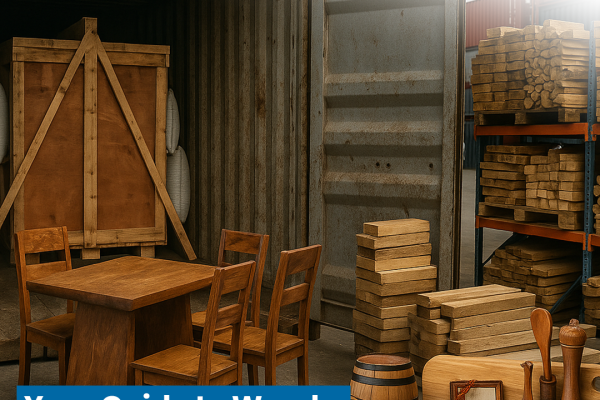One area where Australian importers are most likely to encounter challenges is with timber. It is not only importers of bulk timber who need to be aware of the rules, but also those who bring in wooden products (such as furniture) – make sure you know if your goods contain even small amounts of wood – along with various kinds of packaging and dunnage.
All imported timber, wooden articles, bamboo and related products (whether for commercial or personal use) must comply with the import conditions set out by the Department of Agriculture, Fisheries and Forestry (DAFF).
As the importer, you are responsible for ensuring that your products meet the import regulations. Failing to meet import conditions may result in delays, additional costs, and, in some cases, the re-export or destruction of the goods at your expense.
Most consignments of manufactured wooden articles are treated offshore by heat, fumigation or irradiation methods, and you will need to have a certificate to verify this. Certain imports are able to be treated after arrival in the country, usually by Methyl Bromide Fumigation.
Timber and bamboo packaging or dunnage.
Timber and bamboo packaging used to support, protect or carry imported goods must meet the import conditions outlined in Biosecurity Import Conditions system (BICON). Ask us for more information if you are not familiar with this procedure.
Timber and bamboo packaging includes cases, crates, pallets, bearers, beams, skids, load boards, drums and blocks. These must be treated and declared on the packing declaration. This includes packaging made of solid timber in combination with other materials such as reconstituted wood, plywood, or bamboo.
Import conditions vary depending on the type of packaging and materials used. Timber and bamboo packaging have varying biosecurity risks – as your broker, we can answer all your questions.
Australia’s illegal logging law reforms.
Timber importers are required to take steps to ensure that the wood is at low risk of having been illegally logged.
As of 03 March 2025, Australia’s illegal logging laws have changed. Importantly, this includes changes to due diligence requirements for importers and processors of regulated timber and timber products.
Under Australian law, illegal logging means ‘the harvesting of timber in contravention of the laws of the country where the timber is harvested.’ Importers have legal responsibilities and need to keep abreast of their obligations.
Staying alert to exotic pests in timber.
Australia enjoys freedom from many of the world’s most damaging pests and diseases. There are many exotic pests and insects that could ‘hitch a ride’ to Australia in timber, bamboo, wooden related products, on packaging and inside shipping containers.
These pests include termites and insect borers such as beetles and wasps. They can arrive in timber and timber products as eggs or larvae. Such pests may go unnoticed until frass (a sawdust-like substance produced by feeding wood boring insects) and holes appear or chewing sounds are heard.
It is critical to manage the risk of these pests – they may be harmful to our environment and economy if they enter Australia, spread, and become established.
Talk to us for more information about importing wooden products, including quarantine inspections and treatments. Call Andrew, Tel: +61 7 3890 0800 email enq@collessyoung.com.au.

